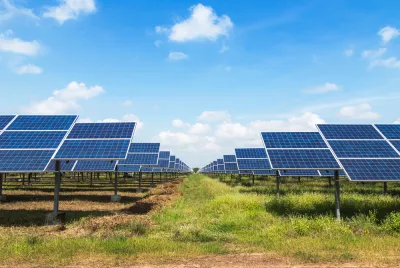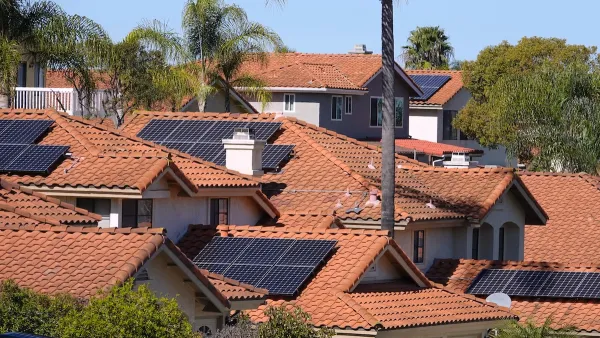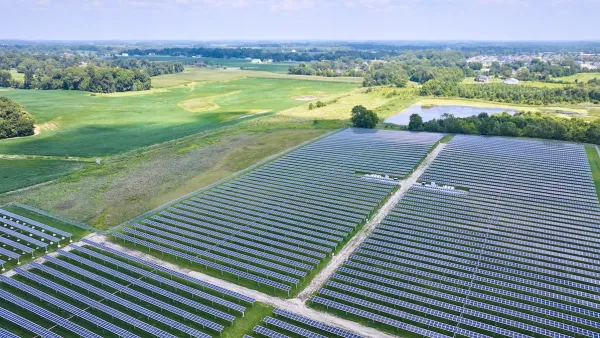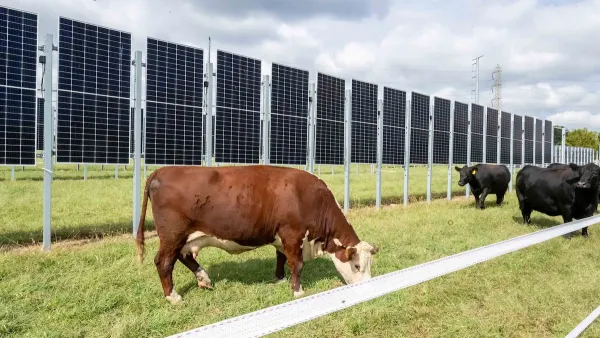A bevy of real and unfounded claims against solar farms is feeding a growing opposition movement in rural areas.

"Solar farms require huge amounts of land, and there’s a fast-growing movement, fueled by politicized social-media campaigns, to prevent solar developers from permitting new sites in rural America," reports Nichola Groom. "Solar currently makes up 3% of U.S. electricity supply and could reach 45% by 2050 to meet the Biden administration’s goals to eliminate or offset emissions by 2050, according to the Department of Energy. To get there, the U.S. solar industry needs a land area twice the size of Massachusetts, according to DOE."
Unlike the first big projects, located in remote, unpopulated areas, "tensions are rising as the sector plans bigger projects and reaches into more populated rural areas unfamiliar with solar." Now, "As solar developers propose new, often sprawling projects in places like Kansas, Maine, Texas, Virginia and elsewhere, local governments and activist groups are seeking to block them and often succeeding. They cite reasons ranging from aesthetics that would harm property values to fears about health and safety, and loss of arable land, farm culture, or wildlife habitat."
The article details the opposition groups, formed and organized primarily via Facebook, that lead efforts to stop large-scale solar projects using an array of real and false claims. While landowners are attracted by the high prices offered by solar companies, "It’s a harder sell to communities as a whole, which often see little economic upside to offset the downsides of large installations, which often create only one or two full-time jobs."
"Local pushback could delay plans by utilities to retire aging coal plants and replace them with solar projects to appease climate-conscious investors and regulators." Solar energy proponents are working to change public perception and address local concerns. "New Jersey, for instance, became a major market for solar despite the state’s dense development, primarily by putting projects on landfills or other disturbed land. And Minnesota has voluntary standards that encourage establishing pollinator-friendly vegetation at solar sites to reduce environmental opposition."
FULL STORY: Special Report: U.S. solar expansion stalled by rural land-use protests

Analysis: Cybertruck Fatality Rate Far Exceeds That of Ford Pinto
The Tesla Cybertruck was recalled seven times last year.

National Parks Layoffs Will Cause Communities to Lose Billions
Thousands of essential park workers were laid off this week, just before the busy spring break season.

Retro-silient?: America’s First “Eco-burb,” The Woodlands Turns 50
A master-planned community north of Houston offers lessons on green infrastructure and resilient design, but falls short of its founder’s lofty affordability and walkability goals.

Test News Post 1
This is a summary

Analysis: Cybertruck Fatality Rate Far Exceeds That of Ford Pinto
The Tesla Cybertruck was recalled seven times last year.

Test News Headline 46
Test for the image on the front page.
Urban Design for Planners 1: Software Tools
This six-course series explores essential urban design concepts using open source software and equips planners with the tools they need to participate fully in the urban design process.
Planning for Universal Design
Learn the tools for implementing Universal Design in planning regulations.
EMC Planning Group, Inc.
Planetizen
Planetizen
Mpact (formerly Rail~Volution)
Great Falls Development Authority, Inc.
HUDs Office of Policy Development and Research
NYU Wagner Graduate School of Public Service




























